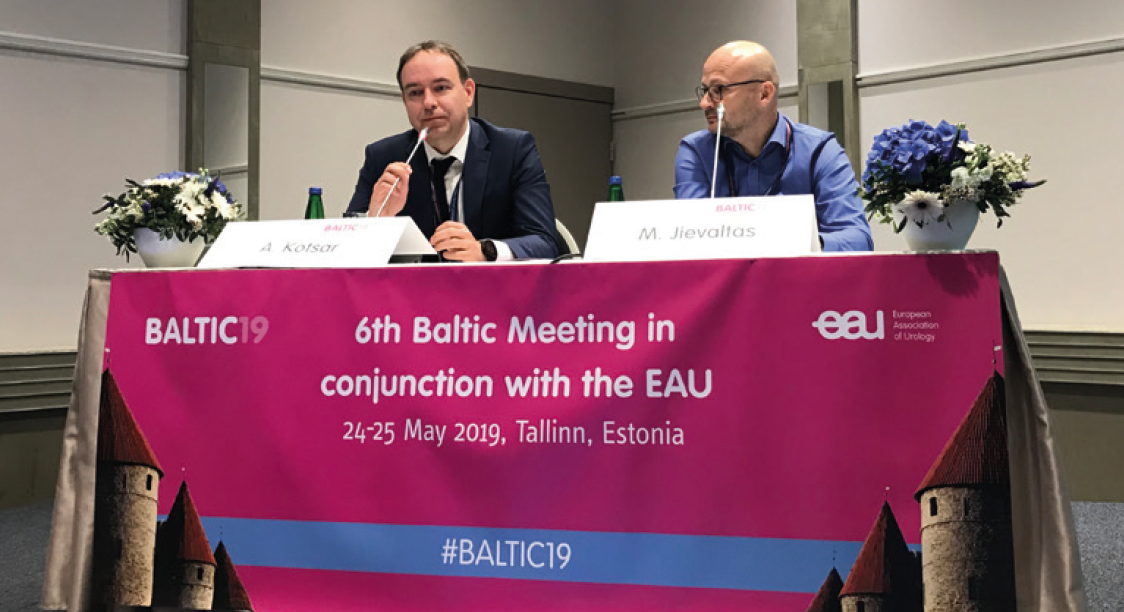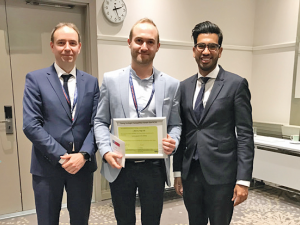by Dr. Rauno Okas (Urology Resident, Tartu University East-Tallinn Central Hospital) and Dr. Andres Kotsar (Chairman, Estonian Society of Urology Tartu University)
From 24 to 25 May 2019, the 6th Baltic Urology Meeting (Baltic19) took place in Tallinn, Estonia and welcomed 319 participants from 24 countries.
Baltic19 commenced with the session dedicated to the use of laparoscopic surgery in urology. Prof. Günter Janetschek (AT) gave a thorough lecture on the history, current state, future perspectives of laparoscopic method and its possibilities.
Within a short period of time, laparoscopy became the gold standard of treatment in some areas of urology (e.g. laparoscopic nephrectomy in case of T2 kidney cancer when nephron sparing surgery is not a feasible option). Dr. Mihhail Žarkovski (EE) gave an overview of the results of laparoscopic radical prostatectomies performed at the Tartu University Hospital from 2015 to 2018. Then Dr. Paulius Bosas (LT) introduced the initial results of laparoscopic cystoprostatectomies at the Lithuanian National Cancer Institute.
The laparoscopy session was followed by the traditional Young Urologist Competition wherein four promising urologists shared and defended their research results. Dr. Priit Veskimäe (EE) discussed the role of PSMA PET/CT in prostate cancer management. The competition winner, Dr. Janis Berzins (LV), gave an overview of the management principles (i.e. early initiation of antibiotic treatment accompanied by surgical debridement) in his lecture “Fournier gangrene is still a challenge”. He concluded that despite great advances in urology, the mortality rate for Fournier gangrene patients is still high. Dr. Minija Cerškute’s (LT) presentation was about the factors influencing postoperative results of nephron sparing surgery. Dr. Sergei Goldytski (BY) spoke about high dose brachytherapy in prostate cancer treatment.
In the course organised by the European School of Urology (ESU) entitled “New Perspectives in the management of upper tract tumours”, Dr. Joan Palou (ES) and Dr. Shahrokh Shariat (AT) shared their expertise such as with regard to the POUT trial, which shows that perioperative systemic therapy is needed to treat micro-metastases and improve survival. Also, patients with papillary high-risk upper tract urothelial carcinoma (UTUC) planned for radical nephroureterectomy (RNU) should receive neoadjuvant cisplatin-based chemotherapy. Additionally, with cases in which previously mentioned neoadjuvant cisplatin chemotherapy was not received, platinum-based adjuvant chemotherapy should be offered for pT2-4 Nx/0 or for all N+ UTUC patients.
Dr. Shrariat also emphasised the role of adequate lymphadenectomy when performing RNU because it reduces recurrence. RNU alone is not sufficient reatment for UTUC in most patients.
ESU’s hands-on trainings were scheduled on both days. Experienced laparoscopic surgeons led by Dr. Petr Macek (CZ) helped young urologists prepare for the European training in basic laparoscopic urological skills (E-BLUS) exams and endourology specialists led by Dr. Achilles Ploumidis (GR) introduced the first steps in cystoscopy and ureteroscopy. They also shared their complicated cases and treatment options during the tips-and-tricks sessions.
The second day of the meeting started with a session dedicated to andrology and office urology. Dr. Oskars Jakušenoks (LV) gave a comprehensive overview of benign penile lesions. Later on, Assoc. Prof. Margus Punab (EE) and Dr. Titas Simaška (LT) debated on the role of prostate massage in case of acute prostatitis or deterioration of chronic prostatitis. Both concluded that it has a role in properly selected cases.
A novel session for the Baltic meetings was the multidisciplinary analysis of a complicated case when ureteral stent was not removed at the right time and had caused the patient multiple problems. In addition to urologists describing the case from a medical point of view, lawyers commented the juridical aspects of the matter.
During the poster sessions, 83 abstracts were presented. Dr. Ned Kinnear (AU) shared the results of a systematic review and meta-analysis on the use of intraoperative cell salvage in urological surgery. He concluded that the results in 14 studies on prostate, bladder and kidney cancer surgeries with 4,536 patients involved suggested that the use of perioperative autologous blood transfusion reduced postoperative allogenic blood transfusion rates and did not increase tumour recurrence nor increase complications rate. Therefore, the limited data on the topic suggests that the use of cell savers on urooncological cases when a huge blood loss is expected has more benefits than hazards.
The winners of the poster session were Dr. Aliaksei Ryndzin (BY) who won the first prize of the Karl Storz Award for his poster “Radical cystectomy in Belarus: Current status” wherein he shared his insights in bladder cancer surgery; and the multinational team led by Dr. Arnas Bakavicius (LT) won the first prize of the Berlin-Chemie Best Poster award for their poster “Predicting abiraterone acetate treatment resistance from blood-circulating androgen receptor variants in castration resistant prostate cancer.”
To sum up, Baltic19 was a successful meeting where local urologists shared the results of their work; EAU experts gave overviews on the latest developments in urology; and young urologists had a chance to improve their skills.


